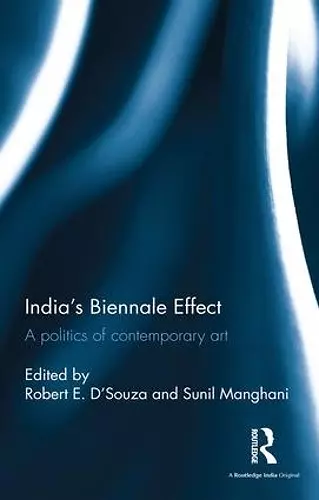India's Biennale Effect
A politics of contemporary art
Robert E D'Souza editor Sunil Manghani editor
Format:Hardback
Publisher:Taylor & Francis Ltd
Published:20th Sep '16
Currently unavailable, and unfortunately no date known when it will be back
This hardback is available in another edition too:
- Paperback£41.99(9780367177355)

India’s Kochi-Muziris Biennale has been described as one of the most significant newly emergent biennales, alongside Shanghai, Sharjah and Dakar. However, there have been few sustained and critical studies of these events as specific sites of production and reception of contemporary art.
This book, engaging with the Kochi Biennale, provides detailed examination of what the editors term as the ‘biennale effect’ — a layered contestation of place, economics, art and politics. It presents a close reading of the unique context of the biennale as well as sets out a broader critical framework for understanding global contemporary art and its effects.
Replete with illustrations, this book will serve as an important and rare resource for scholars and researchers of contemporary art, art history, visual cultures, and media studies.
The Kochi-Muziris Biennale put India on the map of international contemporary visual culture. But the Biennial is much more than a global art event. India's Biennale Effect draws out the Biennale's greater complexity, revealing a movement of contemporary Indian citizens showing and telling their own story.
Chris Dercon, Director, Tate Modern, London, UK
This book is more than a source for ‘India's first biennale’. It is a thoughtful, revisionist consideration of the received accounts of ‘biennale culture’, as it has been articulated in The Biennale Reader, and by writers such as Hans Belting, Jacques Rancière, and Nicholas Mirzoeff. D'Souza and Manghani provide a context to consider the relation between the visual and the ‘grounds of the political’, and to articulate what it means, in Gandhi's image, to have ‘the cultures of all the lands’ blow through the house, without tearing it down.
James Elkins, E. C. Chadbourne Chair of Art History, Theory, and Criticism, School of the Art Institute of Chicago, USA
With a focus on the Kochi-Muziris Biennale, founded in 2012, India’s Biennale Effect maps the complex and shifting interrelationships among local cultural heritage, a regional art market, and global cultural circulations that define the special nature and potential role of the biennale in India.
Ranjit Hoskote, co-curator, 7th Gwangju Biennale, South Korea
While the Kochi-Muziris Biennale is rooted in site specificity, its editions are capable of addressing audiences far beyond the city in which it takes place — to places where people across the globe can have a conversation. This book is the result of such conversations, yet equally explores the various competing and complementing frames and directions through which such dialogue must flow.
Marieke van Hal, Founder of the Biennial Foundation
More than the number of visitors or the media attention it receives, the success of a biennial should more importantly be measured in terms of its reverberations within the worldwide artist’s communities as well as by its scholarly impact. With its in-depth academic writing, both thoughtful and entertaining, India’s Biennale Effect is a testament to the latter and an important read for anyone interested in the arts.
Thomas Girst, Head of Cultural Engagement, BMW Group
India’s Biennale Effect is situated at the heart of critical debates around global art history and contemporary artists’ practice. It offers an array of fascinating insights into the unique conjunction of people, place, time, politics, economics and aesthetics that constitutes India’s first Biennale.
Frances Morris, Director, Tate Modern, London, UK
ISBN: 9781138203525
Dimensions: unknown
Weight: 453g
292 pages